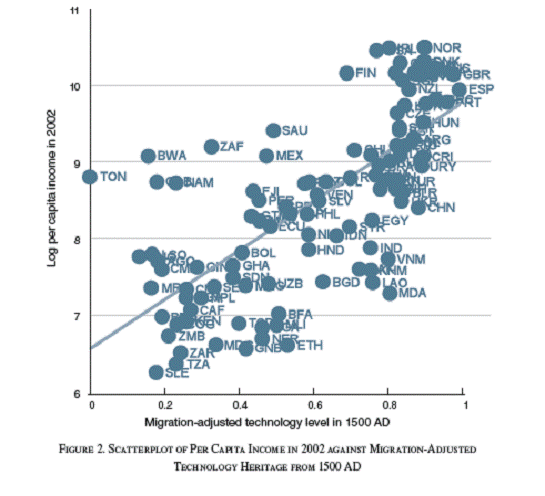UPDATE, Wednesday, July 14: I'm glad we had a good reflective discussion in the blogosphere on these ideas, not the usual polemics. Thanks to all of the bloggers I've noticed who have now commented on this post: Aid Thoughts, Nancy Birdsall at Center for Global Development, Innovations for Poverty Action, Metamorphoses, PSD Blog at the World Bank, and Dennis Whittle at Global Giving (please let me know if I left anyone out).
UPDATE, Sunday July 11: new round of the Hayek wars as they relate to this post (see end of this post below)
UPDATE, Friday evening: Russ Roberts comments on this post at Cafe Hayek.
Yesterday we ran a blog post that fits into a now classic genre in development commentary. This genre, after some discussion, always ends with a conclusion like: “Solution X (a transparency law, microcredit, malaria bed nets, conditional cash transfers, web-based clever thing, eliminating business red tape, etc.) is moderately helpful, but a long way from a panacea.” Of course, nobody really claims explicitly “X will be a panacea!” But each new X is systematically oversold, expectations are raised way too high, and the expectations are always later disappointed.
Here's why direct solutions to problems cannot foster development. Each direct solution depends on lots of other complementary factors, so the solutions can seldom be generalized across different settings; Solutions must fit each local context. Solutions that generate the highest payoff in each setting should be a higher priority than the lowest payoff solutions. Since there is little or no feedback on how well each solution is working in each local situation, there is little possibility for any such adjustments.
Development happens thanks to problem-solving systems. To vastly oversimplify for illustrative purposes, the market is a decentralized (private) problem solving system with rich feedback and accountability. Democracy, civil liberties, free speech, protection of rights of dissidents and activists is a decentralized (public) problem solving system with (imperfect) feedback and accountability. Individual liberty in general fosters systems that allow many different individuals to use their particular local knowledge and expertise to attempt many different independent trials at solutions. When you have a large number of independent trials, the probability of solutions goes way up.
Good systems make the private returns to decentralized problem-solvers close to the social returns. Again oversimplifying to drive home the big point, the market does this with private goods (even allowing for well-known exceptions of market failures), and a free political system is the best way known to do this for public goods (reward political actors in line with the social return to their actions).
The problem-solving systems could very well use some of the same solutions that were discussed above (a transparency law, microcredit, malaria bed nets, conditional cash transfers, web-based clever thing, eliminating business red tape). This leads to much confusion, as people then try to directly imitate particular solutions in the absence of a problem-solving system, which as stated above, leads to disappointing results.
A famous joke is that the Answer to the Ultimate Question of Life, the Universe, and Everything is 42.{{1}} Indeed, 42 could come out of a problem-solving system to solve a particular problem (the guests at my party have brought seven six-packs, will I have enough beer?), but is rather unlikely to generalize to other problems.
The problem-solving system is adapting solutions to local circumstances. And even more importantly, a problem-solving system coordinates the efforts of many different problem-solvers with nobody in charge (for example, in the market, prices serve as signals to coordinate the actions of many different suppliers to solve the problems of demanders).
Direct solutions to problems (say, using aid programs) still may be worthwhile as benefiting a lot of people. But a long list of many such solutions is not development; development is the gradual emergence of a problem-solving system.
UPDATE, Sunday July 11: new round of the Hayek wars as they relate to this post:
Friedrich Hayek is obviously the main source of inspiration for the ideas in this post. But hasn't Hayek now been totally discredited by his association with Glenn Beck? A nice article in the NYT Book Review by Jennifer Schuessler discusses the Beck-Hayek phenomenon.
Beck was invoking Hayek to make the "slippery slope" argument that an extensive systemof social services leads inexorably to something like Fascism or Communism. Hayek's association with this argument looks a lot more dubious once you realize that he was IN FAVOR OF an extensive system of social services. As Schuessler notes:
“The preservation of competition,” {Hayek} wrote, is not “incompatible with an extensive system of social services — so long as the organization of these services is not designed in such a way as to make competition ineffective over wide fields.”
Schuessler also notes Hayek's 1960 essay “Why I Am Not a Conservative”
I had the same argument with (guess who?) Jeff Sachs back in 2006 when he attempted to smear Hayek in a similar way.
Mr. Sachs disses the great Hayek by repeating the old canard that Hayek thought any attempt at taxpayer-funded social insurance would put us all on the "Road to Serfdom." This is an especially strange charge, since Hayek (while certainly opposed to the social engineering that proponents of a full-blown welfare state usually have in mind) himself calls for some form of taxpayer-funded social insurance against severe physical deprivation on pages 133-134 of "The Road to Serfdom." Mr. Sachs, who is currently best known for his star- driven campaign to end world poverty, has apparently spent more time studying the economic thinking of Salma Hayek than that of Friedrich.
Hayek's Road to Serfdom is a superb statement of how a spontaneous order was responsible for Western prosperity, following rules based on individual liberty, and Western prosperity was NOT the result of social planners trying to directly solve social problems. That's how it inspired the post above.
OK let's now go watch the spontaneous order of the World Cup final.
[[1]]Douglas Adams, Hitchhiker’s Guide to the Galaxy[[1]]
 From Aid to Equality
From Aid to Equality














